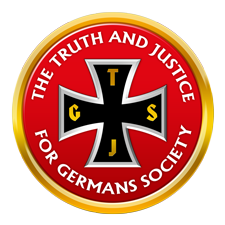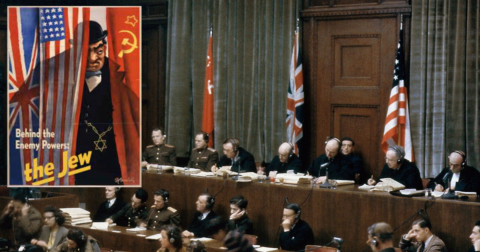The Spanish revisionist, Joaquin Bochaca, stated in an interview printed in the May/June 2013 edition of The Barnes Review that he believes Mein Kampf should be required reading for all school children. I took his advice as I already owned a copy of the book.
What is Mein Kampf? It is the book consisting of two volumes written by Adolf Hitler with the assistance of Rudolf Hess while they were prisoners at the Landsberg prison located in Landsberg am Lech in Bavaria, Germany. Hitler had been sentenced to five years for his involvement in the Beer Hall Putsch of November, 1923.
“He (Hitler) was always reasonable, frugal, modest and polite to everyone, especially the officials at the facility,” prison warden Otto Leybold wrote about the inmate on Sept. 18, 1924. The prisoner, he added, didn’t smoke or drink and “submitted willingly to all restrictions.” Hitler was paroled after being incarcerated for about nine months.
The book’s title Mein Kampf means my struggle in English. It contains Hitler’s autobiography, his political self-education, awakening and political activities. The first volume was published in 1925 and the second volume was published the following year.
There are various translations and abridgements of Mein Kampf. My own 1940 edition contains the unexpurgated translation published by Reynal & Hitchcock of New York. A committee of men from the New School for Social Research undertook the translation and included their extensive explanatory notes. Their English translation flows nicely.
Even though many thousands of copies of Mein Kampf were published in Germany, Christine Miller informed me that few copies were actually read due to its size (my copy is 1003 pages) and its awkward German linguist style. She also told me that copies of Mein Kampf were presented to newlyweds. I saw several of these presentation books available for sale on the website of www.abebooks.com.
This book review of Mein Kampf covers only the contents of Volume One, 559 pages.
Adolf Hitler was born April 20, 1889, in Braunau-on-the-Inn, Austria. His father, Alois Hitler, was able to rise above his own impoverished beginnings to become a civil servant. He hoped that his son would follow his lead into a secure respectable position.
Hitler was a talented artist and pinned his hopes upon a life dedicated to the fine arts. His art professor encouraged Hitler to study architecture. Hitler struggled to overcome the financial handicaps he faced after the death of his father and survived by working at menial jobs while continuing his study of architecture.
Hitler spent years observing the workings of the Austrian Parliament and the methods of the political parties in Germany. He concluded that the “parliamentarians” were not working for the people, but only for pay and reelections. (Just like our politicians.)
He closely observed the Social Democrats and their ruthless takeover of various trade unions. Hitler could see that the masses were looking for a way to lift themselves up from their poverty and the leftists/Communists in the form of the Social Democratic party were speaking directly to their needs while in turn gaining their political support.
Hitler saw just how important it was to obtain the backing of the impoverished masses who knew so little about the true goals of the Marxists. He saw a need for a new party that would stand for nationalism, culture, morals, and a community of the German race.
Hitler served in the German military for about six years and was on active duty for four of those years during the First World War. In 1918, he was blinded temporarily by a British gas attack and was sent to a hospital for medical treatment for this injury.
At the end of the first volume, he explains how he developed the National Socialist German Workers’ Party, one dedicated to improving the lives of the German workers and future generations while it vowed to make them safe from the dangers of Marxism.
In the Preface, Hitler states that oratory is more powerful than the written word. He was living proof of that theory. Where can we find those dynamic courageous speakers?
Here are the titles with “tidbits” from some of the chapters contained in Volume One:
Chapter I – At Home
From page 3: “German-Austria must return to the great German motherland, and not because of economic considerations of any sort. Common blood belongs in a common Reich.”
Chapter II – Years of Study and Suffering in Vienna
From page 66: “Meanwhile I had learned to understand the connection between this doctrine of destruction and nature of a race, which hitherto had been unknown to me.
Understanding Jewry alone is the key to the comprehension of the inner, the real, intention of Social Democracy.
He who knows this race will raise the veil of false conceptions, and out of the mist and fog of empty social phrases there rises the grinning, ugly face of Marxism.”
From pages 83 & 84: “The Jewish doctrine of Marxism rejects the aristocratic principle in nature; instead of the eternal privilege of force and strength, it places the mass of numbers and its deadweight. Thus it denies the value of the individual in man, disputes the meaning of nationality and race, depriving mankind of the assumption for its existence and culture. If, with the Marxian creed, the Jew conquers the nations of the world, his crown will become the funeral wreath of humanity…”
Chapter III – General Political Considerations from my Time in Vienna
From page 123: “The world is not intended for cowardly nations.”
From page 134: “ If the fight for a new view of life is not led by heroes willing to sacrifice themselves, then no more will death-defying fighters be found.”
Chapter IV – Munich
From page 195: “The State is not an assembly of commercial parties…”
From page 200: “one does not die for business, but for ideals.”
From page 202: “With myself and in the small circles of my acquaintances, I was wrathful at German foreign politics, and also at what seemed to me an unbelievably frivolous manner with which one faced the most important problem that confronted Germany in those days: Marxism.”
Chapter V – The World War
Chapter VI – War Propaganda
Chapter VII – The Revolution
Chapter VIII – Beginning of My Political Activity
Chapter IX – The ‘German Workers’ Party’
Chapter X – The Causes of the Collapse
From page 348: “Theater, art, literature, movies, the press, billposters and window displays must be cleaned of the symptoms of a rotting world and put into the service of a moral idea of State and culture.”
Chapter XI – Nation and Race
From page 447 – 449: “They (the Jews) have no thought of building up a Jewish State in Palestine, so that they might perhaps inhabit it, but they only want a central organization of their international world cheating, endowed with prerogatives, withdrawn from the seizure of others: a refuge for convicted rascals and a high school for future rogues.
“It was and is the Jews who bring the negro to the Rhine, always with the same concealed thought and the clear goal of destroying, by the bastardization which would necessarily set in, the white race which they hate, to throw it down from its cultural and political height and in turn to rise personally to the position of master.”
Chapter XII – The First Period in the Development of the
National Socialist German Workers’ Party
From page 479: “He who wants to be the leader bears, with the highest, unrestricted authority, also the ultimate and the most serious responsibility. Only the hero is chosen for this.”
I concur with Bochaca’s belief that everyone should be encouraged to study the logic of Adolf Hitler’s thoughts, especially in light of current events in our own country.
In the blood alone there rests the strength as well as the weakness of man. – Adolf Hitler
Nancy Hitt – 2013
hunleyhitt@earthlink.net



